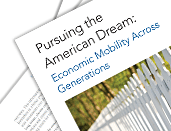 Social mobility dominated water-cooler conversation at Fordham since Charles Murray gave a talk at our place last month and calmly explained that the efficacy of American meritocracy actually hinders social mobility. This recent Pew report (a follow-up to its seminal 2008 work on the topic) has us all back to fill up our cups. It investigates absolute mobility (whether a person has more or less income and wealth than her parents did at the same age) and relative mobility (whether one is ranked higher or lower on the income and wealth continua than her parents). It shows that we’re not as economically stagnant a populace as recent discussion might suggest—but that there remains ample cause for concern. Eighty-four percent of Americans exceed their parents’ family income (normed to 2008 dollars), including 93 percent of those in the bottom quintile. Further, 72 percent of Americans in the bottom quintile exceed their parents’ family wealth (which equals total assets minus total debts). Yet despite these positive indicators, relative mobility is far more elusive. Forty-three percent of Americans who begin on the bottom rung stay there, and nearly three-quarters remain in the bottom 40 percent. A black-white mobility achievement gap is present as well: Half of blacks who were raised on the wealth ladder’s bottom rung stay there as adults, compared to a third of whites. The “stickiness at the ends” phenomenon affects America’s wealthiest as well: Sixty-six percent of those with parents in the top quintile stayed among the elite (earning at least $164,000 a year). As Pew explains (and Charles Murray concurs), this “stickiness” is partially caused by marriage patterns. High earners are forming unions with others in their quintile, further bumping their family wealth and income. Still, education wonks take solace: Graduating college offers reliable footing for climbing the wealth ladder—especially for those at the bottom, where 47 percent of those without a college degree remain compared to 10 percent of those with a college degree. Implying that 90 percent of the poorest youngsters escape poverty if they graduate from college and reminding us why we keep fighting the good fight.
Social mobility dominated water-cooler conversation at Fordham since Charles Murray gave a talk at our place last month and calmly explained that the efficacy of American meritocracy actually hinders social mobility. This recent Pew report (a follow-up to its seminal 2008 work on the topic) has us all back to fill up our cups. It investigates absolute mobility (whether a person has more or less income and wealth than her parents did at the same age) and relative mobility (whether one is ranked higher or lower on the income and wealth continua than her parents). It shows that we’re not as economically stagnant a populace as recent discussion might suggest—but that there remains ample cause for concern. Eighty-four percent of Americans exceed their parents’ family income (normed to 2008 dollars), including 93 percent of those in the bottom quintile. Further, 72 percent of Americans in the bottom quintile exceed their parents’ family wealth (which equals total assets minus total debts). Yet despite these positive indicators, relative mobility is far more elusive. Forty-three percent of Americans who begin on the bottom rung stay there, and nearly three-quarters remain in the bottom 40 percent. A black-white mobility achievement gap is present as well: Half of blacks who were raised on the wealth ladder’s bottom rung stay there as adults, compared to a third of whites. The “stickiness at the ends” phenomenon affects America’s wealthiest as well: Sixty-six percent of those with parents in the top quintile stayed among the elite (earning at least $164,000 a year). As Pew explains (and Charles Murray concurs), this “stickiness” is partially caused by marriage patterns. High earners are forming unions with others in their quintile, further bumping their family wealth and income. Still, education wonks take solace: Graduating college offers reliable footing for climbing the wealth ladder—especially for those at the bottom, where 47 percent of those without a college degree remain compared to 10 percent of those with a college degree. Implying that 90 percent of the poorest youngsters escape poverty if they graduate from college and reminding us why we keep fighting the good fight.
SOURCE: Susan K. Urahn, Erin Currier, Diana Elliot, Lauren Wechsler, Denise Wilson, and Daniel Colbert, Pursuing the American Dream: Economic Mobility Across Generations (Washington, D.C.: The Pew Charitable Trusts, July 2012).
